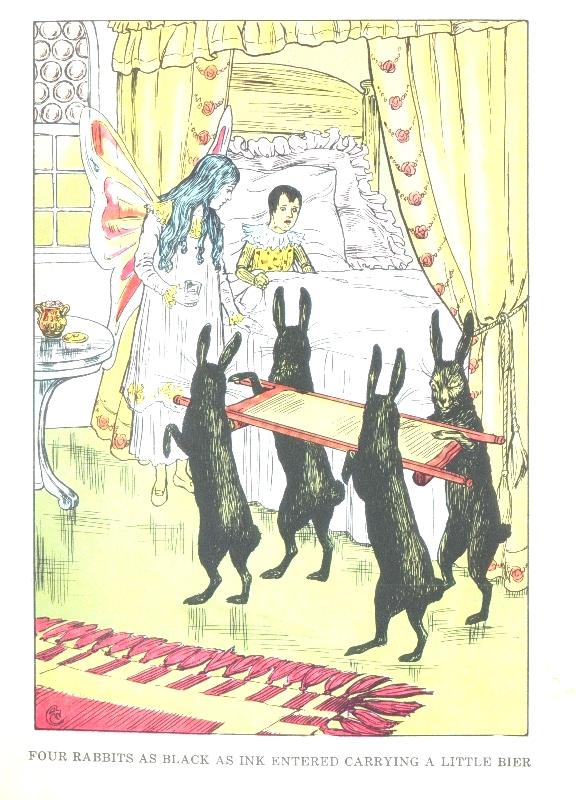Pinocchio
by C. Collodi
Chapter XVI - The Beautiful Child Rescues the Puppet

While poor Pinocchio, suspended to a branch of the Big Oak, was apparently more dead than alive, the beautiful Child with blue hair came again to the window. When she saw the unhappy puppet hanging by his throat, and dancing up and down in the gusts of the north wind, she was moved by compassion. Striking her hands together, she gave three little claps.
At this signal there came a sound of the sweep of wings flying rapidly and a large Falcon flew on to the window-sill.
"What are your orders, gracious Fairy?" he asked, inclining his beak in sign of reverence.
"Do you see that puppet dangling from a branch of the Big Oak?"
"I see him."
"Very well. Fly there at once: with your strong beak break the knot that keeps him suspended in the air, and lay him gently on the grass at the foot of the tree."
The Falcon flew away and after two minutes he returned, saying:
"I have done as you commanded."
"And how did you find him?"
"To see him he appeared dead, but he cannot really be quite dead, for I had no sooner loosened the running noose that tightened his throat than, giving a sigh, he muttered in a faint voice: 'Now I feel better!'"
The Fairy then struck her hands together twice and a magnificent Poodle appeared, walking upright on his hind legs exactly as if he had been a man.
He was in the full-dress livery of a coachman. On his head he had a three-cornered cap braided with gold, his curly white wig came down on to his shoulders, he had a chocolate-colored waistcoat with diamond buttons, and two large pockets to contain the bones that his mistress gave him at dinner. He had, besides, a pair of short crimson velvet breeches, silk stockings, cut-down shoes, and hanging behind him a species of umbrella case made of blue satin, to put his tail into when the weather was rainy.
"Be quick, Medoro, like a good dog!" said the Fairy to the Poodle. "Have the most beautiful carriage in my coach-house harnessed, and take the road to the wood. When you come to the Big Oak you will find a poor puppet stretched on the grass half dead. Pick him up gently and lay him flat on the cushions of the carriage and bring him here to me. Do you understand?"
The Poodle, to show that he had understood, shook the case of blue satin three or four times and ran off like a race-horse.
Shortly afterwards a beautiful little carriage came out of the coach-house. The cushions were stuffed with canary feathers and it was lined on the inside with whipped cream, custard and vanilla wafers. The little carriage was drawn by a hundred pairs of white mice, and the Poodle, seated on the coach-box, cracked his whip from side to side like a driver when he is afraid that he is behind time.
Scarcely had a quarter of an hour passed, when the carriage returned. The Fairy, who was waiting at the door of the house, took the poor puppet in her arms and carried him into a little room that was wainscoted with mother-of-pearl. She sent at once to summon the most famous doctors in the neighborhood.
They came immediately, one after the other: namely, a Crow, an Owl, and a Talking-Cricket.
"I wish to know from you, gentlemen," said the Fairy, "if this unfortunate puppet is alive or dead!"
At this request the Crow, advancing first, felt Pinocchio's pulse; he then felt his nose and then the little toe of his foot: and, having done this carefully, he pronounced solemnly the following words:
"To my belief the puppet is already quite dead; but, if unfortunately he should not be dead, then it would be a sign that he is still alive!"
"I regret," said the Owl, "to be obliged to contradict the Crow, my illustrious friend and colleague; but, in my opinion the puppet is still alive; but, if unfortunately he should not be alive, then it would be a sign that he is dead indeed!"
"And you—have you nothing to say?" asked the Fairy of the Talking-Cricket.
"In my opinion, the wisest thing a prudent doctor can do, when he does not know what he is talking about, is to be silent. For the rest, that puppet there has a face that is not new to me. I have known him for some time!"
Pinocchio, who up to that moment had lain immovable, like a real piece of wood, was seized with a fit of convulsive trembling that shook the whole bed.
"That puppet there," continued the Talking-Cricket, "is a confirmed rogue."
Pinocchio opened his eyes, but shut them again immediately.
"He is a ragamuffin, a do-nothing, a vagabond."
Pinocchio hid his face beneath the clothes.
"That puppet there is a disobedient son who will make his poor father die of a broken heart!"
At that instant a suffocated sound of sobs and crying was heard in the room. Imagine everybody's astonishment when, having raised the sheets a little, it was discovered that the sounds came from Pinocchio.
"When a dead person cries, it is a sign that he is on the road to get well," said the Crow solemnly.
"I grieve to contradict my illustrious friend and colleague," added the Owl; "but for me, when the dead person cries, it is a sign that he is sorry to die."
Return to the Pinocchio Summary Return to the C. Collodi Library









